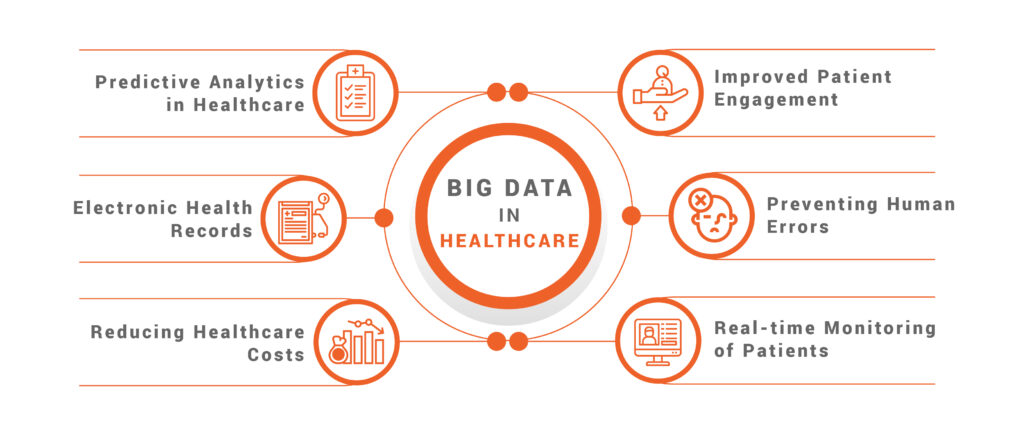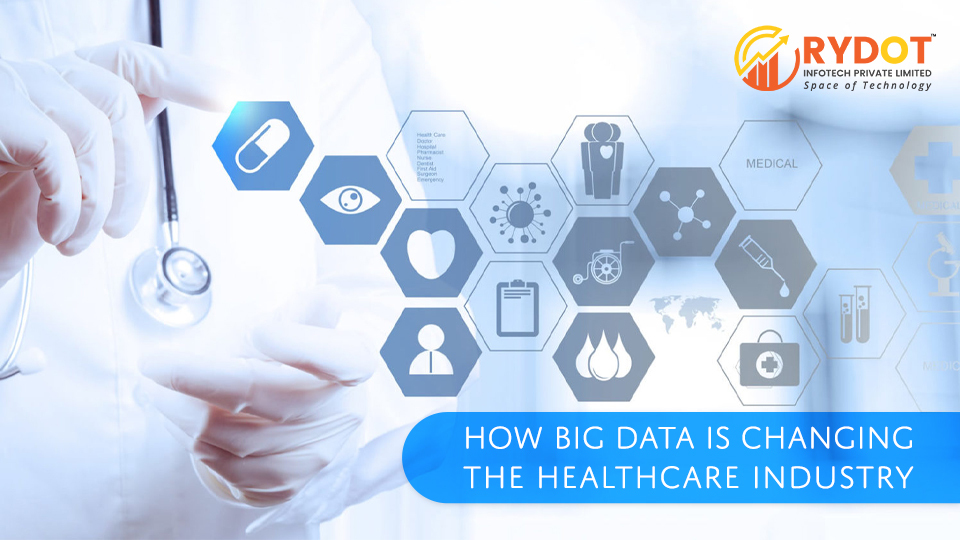![]()
In today’s tech-driven era, the healthcare sector is constantly blooming at a more rapid rate. And, along with that, the requirement to manage patient care and inventive medicine has increased. With the rise in such trends, cutting-edge technologies such as Big Data Analytics are being adopted in the healthcare industry. As per the study done by the International Data Corporation, by 2025, healthcare data will experience a CGPR of 36% which is the highest of any industry.
Therefore, if you are interested in finding out how big data analytics solutions helping the healthcare industry to make the world a better place to live then this blog is for you. Read on to know more about how big data is transforming the healthcare sector.
In this blog, we will discuss 6 ways in which Big Data is helping and changing the complete scenario of the healthcare sector.

1) Predictive Analytics in Healthcare
One of the greatest challenges in the healthcare industry is appropriate diagnostics and on-time disease identification. Early detection and differentiation, as well as, better care are possible with big data technology that offers tools such as predictive analytics. Through data mining and analysis, a doctor can easily find out the root cause of illnesses and reduce life-changing or life-shortening consequences.
2) Electronic Health Records (EHRs)
The other most important application of big data in the healthcare sector is efficient electronic health records access. Using this EHR, patients can have access to their medical records such as test reports, prescriptions, etc. on their fingertips. With EHR, it has become hassle-free keep up and access quickly increasing patient’s data. Warnings and reminders can be automated through big data analytics solutions. So, it can immediately notify both patients and doctors about important information such as their test reports and prescription tracking.
3) Reducing Healthcare Costs
Cost reduction is another huge contribution and it helps hospitals in saving lots of money associated with offering various medical treatments. Besides, using predictive analysis of big data, hospitals can easily discover how many staff members are required. So, it will reduce the rate of investment incurred by hospitals on unnecessary resources such as staff allocation which ultimately helps them utilizing their investment to the max.
Also, predictive analytics helps cutting down costs by reducing the rate of hospital readmissions, improving in-home care, and so on. As per the research, hospitals that can able to quantify their gains from big data analysis reports can increase their revenue by 8% and reduce their cost by 10%.
4) Improved Patient Engagement
Using big data and the latest treatment models, nowadays, patients can get directly involved in monitoring their own health and wellbeing. They can record their daily eating and sleeping habits, heart rates, blood pressure, and other details in the smart tools. For this, they do not need the help of a medical professional. It ultimately makes them pro-active and encourages them to be more health-conscious which leads them to a healthier lifestyle. So, this will have a massive impact on the money and resources spent by medical experts and hospitals.

5) Preventing Human Errors
Many a time, medical experts either recommend a wrong medicine or dispatch different medications mistakenly. Such errors can be easily reduced using Big Data as it can be leveraged to evaluate user data and prescribe medicines.
Of course, some human errors are unavoidable because the staff has to maintain a large quantity of data but the use of Big Data will help reduce mistakes. The software can keep track of the data that is collected and collaborated on patients from diverse medical experts and will notify when any prescription mistakes have been made. So, it will help in saving lives.
6) Real-time Monitoring of Patients
Using Big Data, healthcare professionals can make perspective decisions in the treatment procedure. Various tools can easily collect the patient’s details that a doctor can examine later. So, due to continuous monitoring and real-time notifications, doctors can be aware of their patients’ health. They can take an instantaneous relevant step to treat any unexpected disease when required.
Concluding Remarks
Hence, in nutshell, Big Data Analytics has increased the ability of the healthcare sectors to cure diseases, improve the quality of life, begin early preventive care, spot warning signs sooner, increase preventable care, and predict epidemics. In short, it has immensely changed the healthcare sectors in various ways as discussed above.

